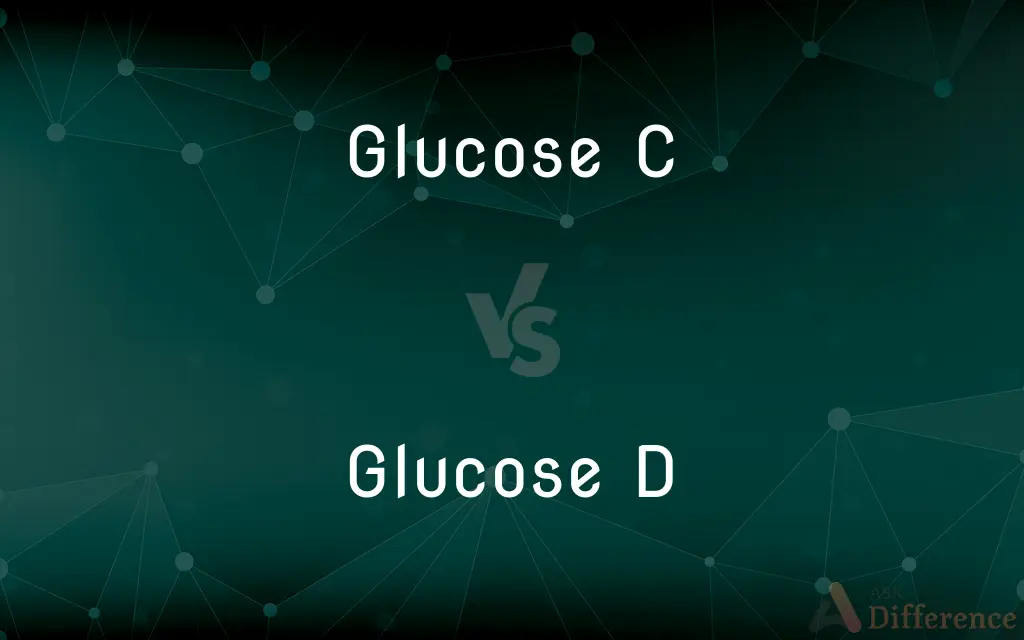Glucose C vs. Glucose D — What's the Difference?
Edited by Tayyaba Rehman — By Fiza Rafique — Published on November 4, 2023
Glucose C isn't a standard term in biochemistry, whereas Glucose D typically refers to D-glucose, a primary form of glucose found in nature.

Difference Between Glucose C and Glucose D
Table of Contents
ADVERTISEMENT
Key Differences
Glucose C isn't a recognized term in the world of biochemistry or nutrition, making its exact definition or understanding rather ambiguous. On the flip side, Glucose D, often referred to as D-glucose, is a standard term that defines the right-handed form of the glucose molecule. Both terms, Glucose C and Glucose D, reference glucose, but their implied context and accuracy differ.
The unfamiliarity with Glucose C might suggest it's not commonly used in scientific or medical contexts. Conversely, Glucose D is universally recognized and represents the primary form of glucose that cells utilize for energy. When discussions arise involving glucose's stereochemistry, both Glucose C and Glucose D might be mentioned, but only the latter has a well-defined context.
Being vigilant about terminology is crucial in scientific settings. While Glucose D has a clear place in discussions about biochemistry and metabolism, introducing an ambiguous term like Glucose C might create confusion. Hence, it's essential to prioritize clarity and accuracy when distinguishing between Glucose C and Glucose D.
Comparison Chart
Definition
Not a standard term in biochemistry
Refers to D-glucose, the right-handed form of glucose
Usage in biochemistry
Ambiguous and rare
Widely recognized and studied
ADVERTISEMENT
Role in metabolism
Undefined
Primary energy source for cells
Stereochemistry
Not associated with a specific form
Represents the right-handed configuration
Commonality in scientific texts
Rarely, if ever, mentioned
Commonly referenced and researched
Compare with Definitions
Glucose C
A possible reference to a form of glucose.
Without proper context, it's challenging to discuss Glucose C.
Glucose D
A crucial molecule in energy metabolism.
Cells break down Glucose D to produce ATP, an energy molecule.
Glucose C
An undefined term in biochemistry.
There's little known about Glucose C in scientific literature.
Glucose D
The most common natural form of glucose.
Foods high in carbohydrates typically contain Glucose D.
Glucose C
A term less frequently used in nutritional contexts.
Most researchers are more familiar with Glucose D than Glucose C.
Glucose D
A standard term in biochemistry referring to D-glucose.
When studying carbohydrate metabolism, Glucose D is often mentioned.
Glucose C
An ambiguous reference to glucose's configuration.
To avoid confusion, always clarify what is meant by Glucose C.
Glucose D
The right-handed form of the glucose molecule.
Glucose D is the primary form of glucose utilized by cells.
Glucose C
A term without a recognized stereochemical association.
Scientific discussions usually skip Glucose C for more defined terms.
Glucose D
The stereoisomer of glucose found in nature.
The stereochemistry of Glucose D differentiates it from other forms.
Common Curiosities
What does Glucose D refer to?
Glucose D refers to D-glucose, the right-handed form of glucose.
Is Glucose C a recognized term in science?
No, Glucose C isn't a standard term in biochemistry.
Are there other forms of glucose besides Glucose D?
Yes, there's L-glucose, which is the left-handed form, but it's rare in nature.
Is Glucose C a type of glucose?
The term Glucose C isn't standard, so its exact definition is ambiguous.
How is Glucose D different from other sugars?
Glucose D is a monosaccharide, while others might be disaccharides or polysaccharides.
Can I find Glucose C in scientific literature?
Glucose C is rarely, if ever, mentioned in scientific literature.
Why is Glucose D important?
Glucose D is the primary form of glucose cells use for energy.
Is Glucose D safe to consume?
Absolutely, Glucose D is a primary energy source for our cells.
Why haven't I heard of Glucose C?
Likely because it's not a recognized term in scientific and nutritional contexts.
Does the human body produce Glucose D?
Yes, the body can produce Glucose D, especially in the liver.
Can I consume Glucose D?
Yes, Glucose D (D-glucose) is commonly found in foods with carbohydrates.
Where can I find more information on Glucose D?
Scientific literature, textbooks on biochemistry, or reputable online sources.
Are Glucose C and D enantiomers?
While Glucose D has an enantiomer (L-glucose), Glucose C's relation is undefined.
Is Glucose D the same as dextrose?
Yes, dextrose is another name for D-glucose.
Can Glucose C be found in foods?
Since Glucose C isn't a standard term, its presence in foods is not defined.
Share Your Discovery

Previous Comparison
Rummy Game vs. Poker Game
Next Comparison
Ethene vs. EthyneAuthor Spotlight
Written by
Fiza RafiqueFiza Rafique is a skilled content writer at AskDifference.com, where she meticulously refines and enhances written pieces. Drawing from her vast editorial expertise, Fiza ensures clarity, accuracy, and precision in every article. Passionate about language, she continually seeks to elevate the quality of content for readers worldwide.
Edited by
Tayyaba RehmanTayyaba Rehman is a distinguished writer, currently serving as a primary contributor to askdifference.com. As a researcher in semantics and etymology, Tayyaba's passion for the complexity of languages and their distinctions has found a perfect home on the platform. Tayyaba delves into the intricacies of language, distinguishing between commonly confused words and phrases, thereby providing clarity for readers worldwide.











































